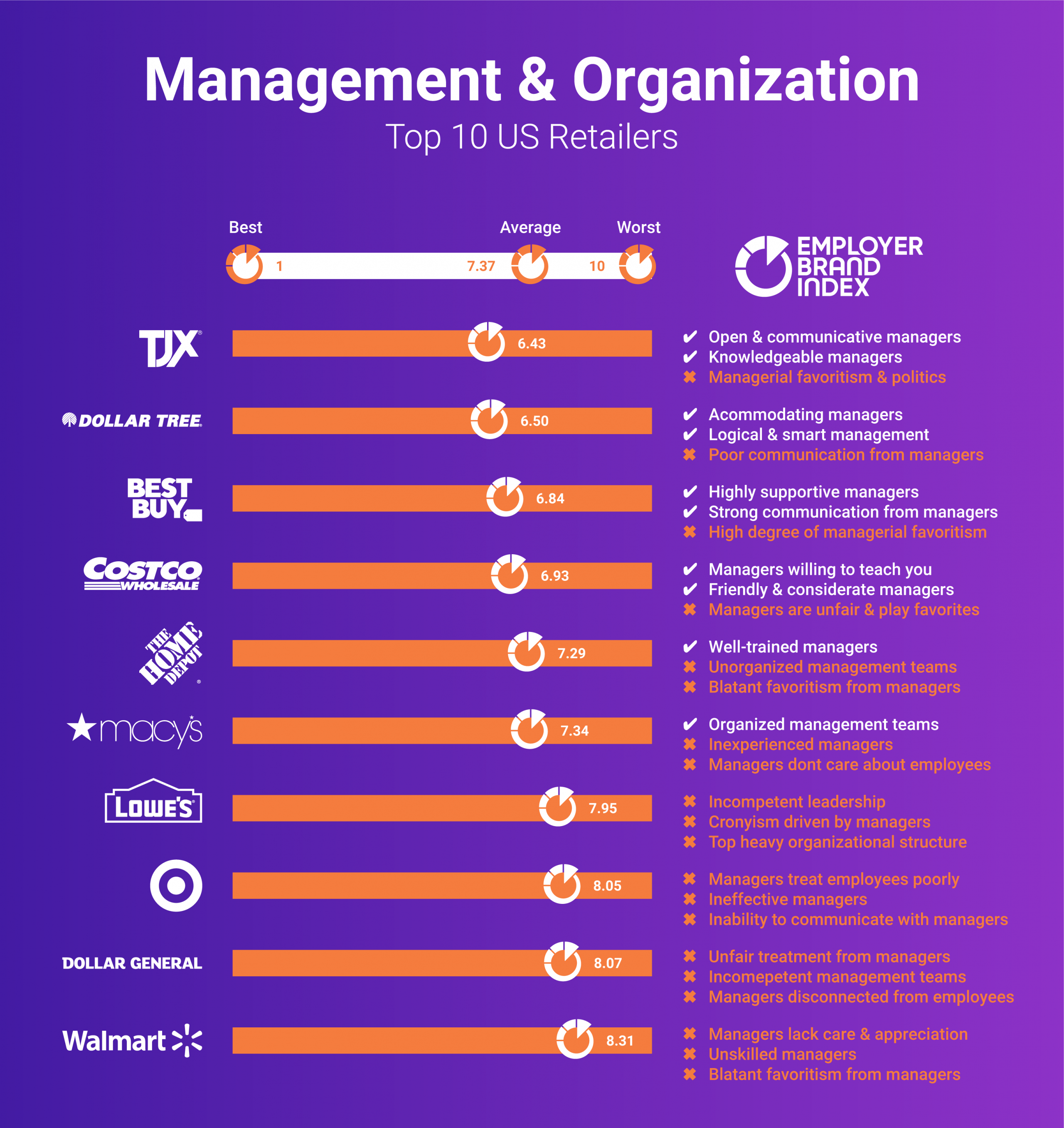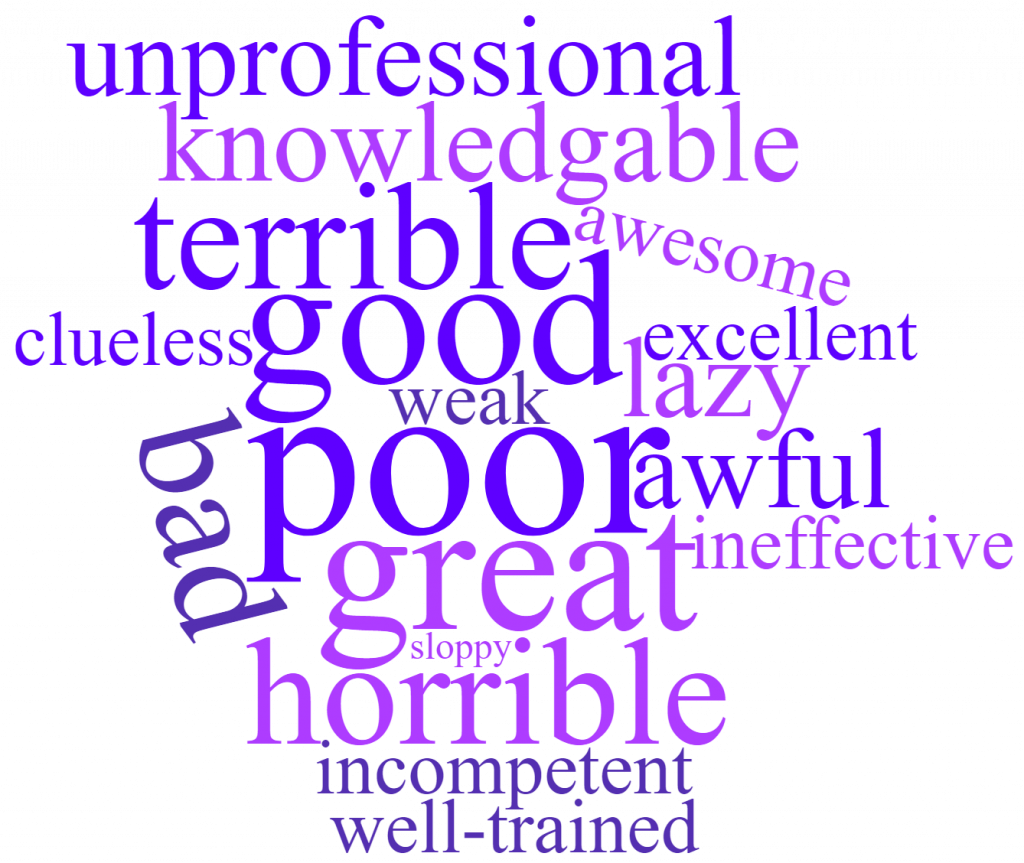
As the retail world is so heavily reliant on the trends and tastes of its consumers, it means it is an industry that is ever-changing. This constant need to adapt to the times provides implications for many important business factors, especially employer brand. This is because as demand grows for their products, so does the need to hire the best talent in the market.
And when you’re talking about the top 10 retail companies in the United States, from the likes of Dollar Tree all the way to Walmart, more often than not, there are more jobs available than candidates. Thus retail companies have to be shrewd in their approach and find ways to differentiate themselves from competitors.
One key aspect of this is through their leadership. The employee culture and overall employer brand within any retail store lives and dies by their managers. It is the Management & Organization that set the standards. A good retail manager wears many hats and has to be able to not only run the store efficiently but also to keep staff motivated, maintain employee schedules, enforce company policies and much, much more.
So, using our proprietary methodology, the Employer Brand Index, we wanted to generate our own understanding of the impact of Management & Organization, one of our 16 employer brand attributes, within the US retail industry.
We analyzed the following retail companies (ordered alphabetically), picked primarily based on their total revenue according to the Fortune 500. Amazon was left out of this research as it does not have a brick & mortar retail store footprint like the following companies, who together have over 4 million employees in the United States: Best Buy, Costco, Dollar General, Dollar Tree, Home Depot, Lowe’s, Macy’s, Target, TJX, and Walmart.
How we did it
We scoured through thousands of publicly obtainable commentary on user-generated platforms like Twitter, Indeed, Reddit, LinkedIn, Glassdoor and many more to dissect only data points regarding Management & Organization.
We looked at all English-language-based comments in March 2019 to ensure that these findings are as current as possible. It’s important to note, though, that these findings are just a snapshot into life at these companies and may not be entirely representative of their employer brands. We typically measure a company’s employer brand online on a quarterly basis as it provides a consistent and representative pool of data to draw conclusions from.
Once data collection is complete, we measure these findings using our Employer Brand Index methodology. Each company was scored on our 1 to 10 scale, 1 being the best score you can get and 10 being the worst.
Below are the most prominent data-driven themes in the area of Management & Organization that arose from the commentary, and the total share of voice of these themes for all companies combined:
How they ranked
The graphic below is a summary of how each company scored on our 1 to 10 scale. Remember: 1 is a perfect score and 10 is the worst possible score. The commentary you will find on the right-hand side of the graphic are examples of the most common themes and subjects.
1. TJX Companies Inc. (6.43)
In first place is TJX Companies Inc, which comprises of popular retail stores like TJ Maxx, Marshalls and HomeSense across the United States. One key theme that set them apart from the rest of the nine retail powerhouses was Communication, Trust & Approachability, which had a strong 12% positive impact on their score.
This topic was primarily positive for the various TJX subsidiaries, with people describing their managers as “easy to get along with” and “easy to talk to”. And many go on to speak about the positive relationships they have with their managers and the open door policies their managers promote.
This tied into the theme Support & Mentorship, which was also commented on primarily positively by TJX’s people. Managers were found to be supportive when it came to training and understanding when it came to scheduling issues.
Yet, as the score of 6.41 indicates, there were a few notable negative themes that should be highlighted:
- Favoritism, Fairness & Politics: Over 10% of the data presented problems that people had with the high degree of employee favoritism at their store and the office politics driven by their managers.
- Treatment, Behavior & Appreciation: While discussion on this theme was mixed and some people (8%) felt they were treated well by their managers, many others (10%) called their managers ‘abusive’, ‘rude’, ‘unprofessional’ and more.
- Expectations, Decision Making & Directions: This theme was almost primarily negative, with many people (6%) describing their managers’ expectations as ‘inconsistent’ and discussing how this has a negative effect on their work/life balance.
2. Dollar Tree (6.50)
In second place is the popular discount retail chain, Dollar Tree, which primarily stood out when it came to their Ability, Knowledge & Competency and Support & Mentorship. Managers, in terms of their ability, were spoken about positively on the most part with people describing them as ‘logical’, ‘awesome’ and more. This theme had a 10% share of voice on their score, and, therefore, a strong positive impact.
But what was more significant for Dollar Tree was the support and mentorship people felt they received from managers, who were described as not only accommodating and supportive but also as very happy to share knowledge and teach employees in times of need.
Yet, as the score of 6.50 indicates, there were a few notable negative areas:
- Treatment, Behavior & Appreciation: People primarily spoke about the behavior of their managers being ‘unprofessional’ ‘not friendly’ and ‘threatening’ (12.5%).
- Communication, Trust, Approachability: Managers were mostly criticized for their poor communication skills, with people saying the communication was ‘non-existent’ ‘poor’ and ‘useless’ (12%).
- Control, Micro-Management & Flexibility: Managers were regarded to be very controlling and inflexible when it came to people’s schedules, and many felt they were constantly micromanaged and unable to have any degree of autonomy at work (12%).
3. Best Buy (6.84)
With a score of 6.79, Best Buy placed third on our list due to strong commentary on the Support & Mentorship people receive from their leaders. This theme made up 13% of its data, with people saying their managers take time off from their day to help them and are supportive of their career progression and development.
The topic of Communication, Trust & Approachability was also positively commented upon by Best Buy’s employees, with people saying their managers are very understanding and can communicate well with their employees (9%).
Where Best Buy fell short was very much centered upon the theme; Favoritism, Fairness & Politics. People said things such as:
- “I’m not treated fairly by my manager”
- “Favoritism is extremely common”
- “Managers have their own agenda”
Commentary on this topic made up 16% of their data and had a strong negative impact on their overall score, highlighting a significant problem with fairness and quality at Best Buy.
4. Costco (6.93)
In fourth place with a score of 6.93 is Costco Wholesale Corporation, more commonly known as Costco. Its commentary, similar to Best Buy, was centered upon one positive theme; Support & Mentorship, and one negative theme; Favoritism, Fairness & Politics.
Positively speaking, commentary on Support & Mentorship revolved around people describing their management as “supportive”, “willing to teach you” and “understanding”. This theme had a 10% positive impact on their score.
Negatively speaking, the theme of Favoritism, Fairness & Politics had a strong negative impact (13%) on their score, with people claiming that favoritism is a norm within the organization and their managers “favor certain employees” and “play favorites” with friends and family.
5. Home Depot (7.29)
In fifth place is Home Depot, who is coincidentally the 5th biggest private-employer in the United States as well. The world-renowned home improvement store’s commentary revolved around one key theme which was Ability, Knowledge & Competency.
This theme had a high share of voice (27%), and was split both positively (12%) and negatively (16%). Positively, people regarded their managers as “outstanding” and “well trained”, while many others regarded their managers “sloppy”, “lazy” and “unorganized”, which highlighted the inconsistency of the management ability across the 2,200+ stores they operate in North America.
Furthermore, the theme Favoritism, Fairness & Politics was primarily commented upon negatively, and had an 11% impact on their score, with people saying they are only treated fairly if they are liked by management, and that there is “blatant” favoritism within their places of work.
On a lesser scale, the theme Support & Mentorship was quite positive for Home Depot, as people said their managers offered them support when needed and the word ‘help’ or ‘helpful’ was used quite often when people described their managers (7%).
6. Macy’s (7.34)
Macy’s, one of America’s premier omnichannel retailers, placed sixth with a score of 7.34 and like Home Depot, the theme Ability, Knowledge & Competency was the highlight of its discussion. This theme made up over 20% of its data and the sentiment on the topic was quite mixed.
While 10% of people regarded their managers as ‘strong’ and ‘organized’, just over 13% of them felt much differently with comments such as ‘clueless’, ‘unprofessional’ and ‘inexperienced’ used to describe the management teams at Macy’s.
Furthermore, two other themes were found to be problematic for Macy’s. One of which was Favoritism, Fairness & Politics. Almost 10% of the data showed that favoritism was an issue at the company, with managers favoring who they like for better hours and promotion opportunities.
The other was Treatment, Behavior & Appreciation and commentary on this theme revolved around the behavioral aspect of their managers. People described their managers as ‘rude’ and ‘lazy’, and many criticized their managers for not caring enough about their employees. This issue made up over 11% of their data and, thus, had a strong negative impact on their score.
7. Lowe’s (7.95)
In seventh place is Lowe’s, with a score of 7.95, who begin the discussion for the companies who had below-average scores (anything above 7.37). There were three key problem themes for the retail giant:
- Ability, Knowledge & Competency: While 8% of people held their managers in high regard, more than double (17%) criticized their managers for being ‘poor’, ‘incompetent’, ‘slow’ and much more.
- Favoritism, Fairness & Politics: Just under 10% of people spoke about the favoritism and cronyism in their places of work and many dislike the political environments they work within, driven by their leaders.
- Organizational Structure & Change: While commentary on this issue was minor (6%), it was spoken about very negatively by people who complained about the constant organizational changes at the company and the organization is ‘too top heavy’ with managers.
There were no significant positive themes to report for Lowe’s.
8. Target (8.05)
In 8th place is Target, the eighth-largest retailer in the United States, with a score of 8.05 due to issues spread across a number of different themes. These four themes caused major implications on Target and made up almost 50% of their data set:
- Treatment, Behavior & Competency: 14% of people regarded their managers as ‘unprofessional’, ‘rude’ and many alluded that they would throw employees under the bus often.
- Ability Knowledge & Competency: 11% of people felt their managers lacked when it came to this theme and described their managers as ‘ineffective’ and ‘severely lacking’.
- Favoritism, Fairness & Politics: 10% of the data showed that employees felt their managers played favorites and gave ‘better hours’ to their friends.
- Communication, Trust & Approachability: 10% of people criticized the lack of communication with their managers, such as the inability to talk to their managers about certain issues they are having at work.
There were no significant positive themes to report for Target.
9. Dollar General (8.07)
With over 15,000 stores across the United States, Dollar General placed in second last with a score of 8.08 due to problems spanning across a number of themes. But two, in particular, were highly problematic.
Over 15% of the data showed negative sentiment towards the Ability, Knowledge & Competency of the managers at Dollar General, and the word ‘poor’ came across very often when people described their manager’s organizational skills and overall ability.
On another note, the theme Treatment, Behavior & Appreciation also damaged Dollar General’s score significantly, with almost 14% of the commentary revolving around the poor treatment people receive from their managers and the lack of care they feel their managers offer them.
There were no significant positive themes to report for Dollar General.
10. Walmart (8.31)
In last place is Walmart, the largest private employer in the world, with a score of 8.31 due to a number of different negative factors, but we will focus on the three most prevalent ones:
- Treatment, Behavior & Appreciation: Over 15% of the data showed negative sentiment towards this theme, with people saying general things like their managers lack care and treat associates poorly.
- Ability, Knowledge & Competency: The words ‘poor’, ‘horrible’ and ‘bad’ were used consistently when people described the competency of Walmart’s managers. These issues made up 14% of Walmart’s data and had a strong negative impact on their overall score.
- Favoritism, Fairness & Politics: 10% of the data presented problems for Walmart especially in regards to managerial favoritism as people felt management gave opportunities to friends and referring to the ‘good old boys clubs’ in their places of work.
To a lesser extent, Walmart did have issues in regards to the theme Control, Micro-Management & Flexibility (7%), particularly the lack of flexibility managers show when it comes to employee scheduling and attendance.
There were no significant positive themes to report for Walmart.
How do people generally really feel about their managers?
A large portion of the data (20%) tended to be very general, with comments such as ‘bad management’ or ‘good management’ coming up quite often. And extracting meaning out of these generalities can be difficult because the word good or bad can constitute so many different things.
Yet, in the case of this research, it actually helped paint a picture as to how competent people feel their managers and leaders are at the company. Below are the most common descriptors:
As visualized above, the word ‘poor’ was the most commonly used description, and if you were to analyze the ratio of sentiment for this topic as a whole, it would be 66% negative and 34% positive.
And as the report shows, from the fifth-placed Home Depot to the tenth-placed Walmart, negative commentary surrounding the theme Ability, Knowledge & Competency had the highest or one of the highest shares of voice within their respective data sets.
This not only emphasizes the impact of poor management or inadequate leadership on their poor scoring within this research but their overall employer brand and talent retention!
Manager’s don’t care about employees
This is a pretty strong statement, but our research methodology is driven by what people say and we convey what they say as bluntly as possible. And the theme Treatment, Behavior & Appreciation as a whole had a very strong negative impact on the scores for Walmart, Target, Dollar General and more.
A major part of this was the lack of care and appreciation employees felt they received from managers. Kate Pritchard, our Head of Insights, had some very interesting thoughts about this issue:
“Managers in the retail industry have a difficult job, working in highly operational roles, often with a flexible workforce who could be working different shift patterns to them. This makes it even more important to get the fundamentals of management right: treating employees fairly and with respect, being available to offer support and recognize great work. Small changes in the way managers interact with employees can have a large impact on their experience at work.”
On the whole, this theme made up almost 20% of the entire data pool for this research, which shows how important it is for people to be recognized, appreciated and cared about by their managers.
Favoritism is a norm
Examining the data we did notice the importance of friendship and team culture for each of these retail organizations, but it seems as though, more often than not, these friendships have boiled into favoritism.
The research shows that 8 out of the 10 companies had significant issues with the theme Favoritism, Fairness & Politics. The words ‘favoritism’ or ‘favorites’ came up often and some of the issues pertinent to this were:
- Better schedules are given to friends & family
- Promotions are given to friends & family
- Management boys clubs in the workplace
- Managers driving their own personal agendas
This type of inequality can be hard to control for retail organizations the size of Walmart and Target, who put their trust into thousands of managers and supervisors across the country.
Yet it is an issue that needs to be focused on, because allowing this type of behavior will have serious implications on any organizations employer brand, especially in regards to talent retention because the best people will not be fairly selected for the role and those that see this happen will ultimately lose trust in the organization.
As the common saying goes ‘People Leave Managers, Not Companies’. And while this blanket statement isn’t always true, it feels extremely fitting for the retail industry.
Interested in how your company measures up for Management & Organization and other attributes? Check out the Employer Brand Index today.
- Tagged With:
- Employer brand index
- Management & Organization
- Walmart
STAY CONNECTED.
DATA-DRIVEN EMPLOYER
BRAND INSIGHTS.
Our newsletter is exclusively curated by our CEO, Jörgen Sundberg, for leaders who make decisions about talent. Subscribe for updates on The Employer Branding Podcast, new articles, eBooks, research and events we’re working on.






